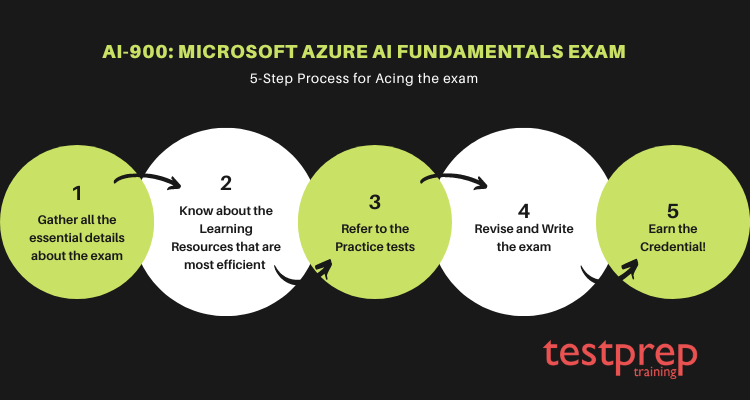If you are an artificial intelligence enthusiast looking to advance your career with the Microsoft Azure AI Fundamentals AI-900 Certification Exam, you have come to the right place. Azure’s AI services enable developers all over the world to create chatbots, computer vision, and predictive engines, and digitally transform today’s businesses. Now is the time to complete your certifications and advance your career as a Microsoft Azure AI professional. Let us know How to Pass the AI-900: Microsoft Azure AI Fundamentals Exam!
About AI-900: Microsoft Azure AI Fundamentals Exam
The Microsoft Azure AI Fundamentals (AI-900) exam is intended for candidates with fundamental knowledge of machine learning (ML), artificial intelligence (AI), and related Microsoft Azure services. Furthermore, this exam allows candidates to demonstrate their understanding of common ML and AI workloads and how to implement them on Azure. The Microsoft Azure AI Fundamentals (AI-900) exam is designed for both technical and non-technical candidates.
Let us now move to the main topic of discussion now –
Tips to pass AI-900: Microsoft Azure AI Fundamentals Exam
There are various methods for preparing for the Microsoft Certified Azure AI-900 exam. You can proceed by following the steps outlined below:

1. Understand the Exam Structure
The Microsoft Azure AI Fundamentals (AI-900) exam consists of 40-60 multiple-choice questions. The Microsoft Azure AI-900 exam may contain scenario-based single answer questions, multiple-choice questions, arrange in the correct sequence type questions, drag & drop questions, mark review, drag-drop, and so on. To pass the exam, however, a candidate must score at least 700. The examination fee, including taxes, is $99 USD to apply for the exam. Candidates for the AI-900 exam will have the option of taking the exam in English, Japanese, Chinese (Simplified), Korean, German, French, or Spanish.
2. Understand the Key Concepts
The updated Microsoft AI-900 exam topics include:
Topic 1: Describe Artificial Intelligence workloads and considerations (15-20%)
1.1 Identify features of common AI workloads
- Identify features of content moderation and personalization workloads
- identify computer vision workloads (Microsoft Documentation: Applying content tags to images, Detect common objects in images, Detect popular brands in images)
- identifying natural language processing workloads (Microsoft Documentation: Choosing a natural language processing technology in Azure)
- identify knowledge mining workloads (Microsoft Documentation: Explore knowledge mining)
- Identify document intelligence workloads
- Identify features of generative AI workloads
1.2 Identify guiding principles for responsible AI
- describing the considerations for fairness in an AI solution (Microsoft Documentation: Model performance and fairness (preview))
- explaining the considerations for reliability and safety in an AI solution (Microsoft Documentation: Responsible and trusted AI)
- describing the considerations for privacy and security in an AI solution (Microsoft Documentation: Responsible AI)
- explaining the considerations for inclusiveness in an AI solution (Microsoft Documentation: Responsible and trusted AI)
- describing considerations for transparency in an AI solution (Microsoft Documentation: Identify guiding principles for responsible AI)
- describing considerations for accountability in an AI solution (Microsoft Documentation: Responsible and trusted AI, Identify guiding principles for responsible AI)
Topic 2: Describe fundamental principles of machine learning on Azure (20-25%)
2.1 Identify common machine learning techniques
- identifying regression machine learning scenarios (Microsoft Documentation: Linear Regression)
- identifying classification machine learning scenarios (Microsoft Documentation: Classification modules)
- identify clustering machine learning scenarios (Microsoft Documentation: Clustering modules)
- Identify features of deep learning techniques
2.2 Describe core machine learning concepts
- identifying features and labels in a dataset for machine learning (Microsoft Documentation: Create and explore Azure Machine Learning dataset with labels)
- explaining how training and validation datasets are used in machine learning (Microsoft Documentation: Configure training, validation, cross-validation and test data in automated machine learning)
2.3 Describe Azure Machine Learning capabilities
- Describe capabilities of Automated machine learning (Microsoft Documentation: Automated machine learning (AutoML))
- Describe data and compute services for data science and machine learning
- Describe model management and deployment capabilities in Azure Machine Learning
Topic 3: Describe features of computer vision workloads on Azure (15-20%)
3.1 Identify common types of computer vision solution:
- identifying features of image classification solutions (Microsoft Documentation: Train image classification models with MNIST data and scikit-learn)
- identify features of object detection solutions (Microsoft Documentation: Detect common objects in images)
- identifying features of optical character recognition solutions (Microsoft Documentation: Optical Character Recognition (OCR))
- identify features of facial detection and facial analysis solutions
3.2 Identify Azure tools and services for computer vision tasks
- Describe capabilities of the Azure AI Vision service
- Describe capabilities of the Azure AI Face detection service
Topic 4: Describe features of Natural Language Processing (NLP) workloads on Azure (15-20%)
4.1 Identify features of common NLP Workload Scenarios
- identifying features and uses for key phrase extraction (Microsoft Documentation: How to extract key phrases using Text Analytics)
- identify the features and uses for entity recognition (Microsoft Documentation: Entity Recognition cognitive skill)
- identifying features and uses for sentiment analysis (Microsoft Documentation: What is sentiment analysis and opinion mining)
- identifying features and uses for language modeling (Microsoft Documentation: language detection in Azure Cognitive Service for Language)
- identify the features and uses for speech recognition and synthesis (Microsoft Documentation: Get started with speech-to-text, Speech service)
- identifying features and uses for translation (Microsoft Documentation: Translator service)
4.2 Identify Azure tools and services for NLP workloads
- identifying capabilities of the Azure AI Language Service (Microsoft Documentation: Azure Cognitive Service for Language)
- identify the capabilities of the Azure AI Speech service (Microsoft Documentation: Speech service)
Topic 5: Describe features of generative AI workloads on Azure (15–20%)
5.1 Identify features of generative AI solutions
- Identify features of generative AI models
- Identify common scenarios for generative AI
- Identify responsible AI considerations for generative AI
5.2 Identify capabilities of Azure OpenAI Service
- Describe natural language generation capabilities of Azure OpenAI Service
- Describe code generation capabilities of Azure OpenAI Service
- Describe image generation capabilities of Azure OpenAI Service
3. Using the appropriate resources
Some of them are –
Microsoft Docs – The source of knowledge that provides detailed information about the AI-900 exam guide is Microsoft documentation. Furthermore, you will learn about the various scales of Azure AI services. Microsoft Docs is made up of modules that will help you learn a lot about AI and the various services in a systematic manner.
Follow Public Forums – You can find certified Microsoft professionals on Quora, Reddit, Stackoverflow, and other related public forums. Forums can help you understand how to begin preparing on a more human level.
Training with an Instructor – This instructor-led training course covers the fundamental concepts of artificial intelligence (AI) and the Microsoft Azure services for developing AI solutions. This course, however, is not intended to train students to become professional data scientists or software developers. However, for developing an understanding of common AI workloads and the ability to identify Azure services that can support them.
4. Refer to the Practice Tests
Practice tests are useful for better preparation because they allow you to assess your own weak and strong points. Furthermore, you will be able to improve your answering skills, which will result in significant time savings. And, the best time to begin doing Microsoft AI-900 exam practice tests is after you have completed one full topic because this will serve as a revision tool for you. So, make certain to locate the best practice sources.
5. Concepts’ Revision
Revision entails a lot of practice, practice, and more practice. Rereading study guides and expanding on critical theoretical concepts related to the exam constitutes revising concepts. Before beginning the exam, use practice tests, video courses, and Hands-On Labs to solidify your Azure AI exam concepts. Take as many mock exams as you can because they will help you revise key concepts.
Let us now know why should you earn this credential?
Why get certified?
Candidates will gain extensive knowledge of Artificial Intelligence as well as the ability to identify Microsoft Azure services to support them. With the fundamental knowledge of Microsoft Azure AI Fundamentals certification, you can advance your career as an Azure Data Scientist Associate or Azure AI Engineer Associate. IT jobs for people who work with data and use Microsoft Azure Services are plentiful. Candidates with Microsoft certification badges on their resumes have a significant advantage. Certification is a quick way to demonstrate to others that your abilities have been validated.
Final Words
To wrap everything up, there are a couple of essential factors you should keep in mind before taking the AI-900 exam: Microsoft Certified Azure AI Fundamentals certification. First, it is crucial to understand the certification requirements and the exam structure. Then, you must familiarize yourself with all the study guides and related documentation available online. Practical assessments and mock exams are the next steps once you’ve mastered all of the theoretical concepts.


